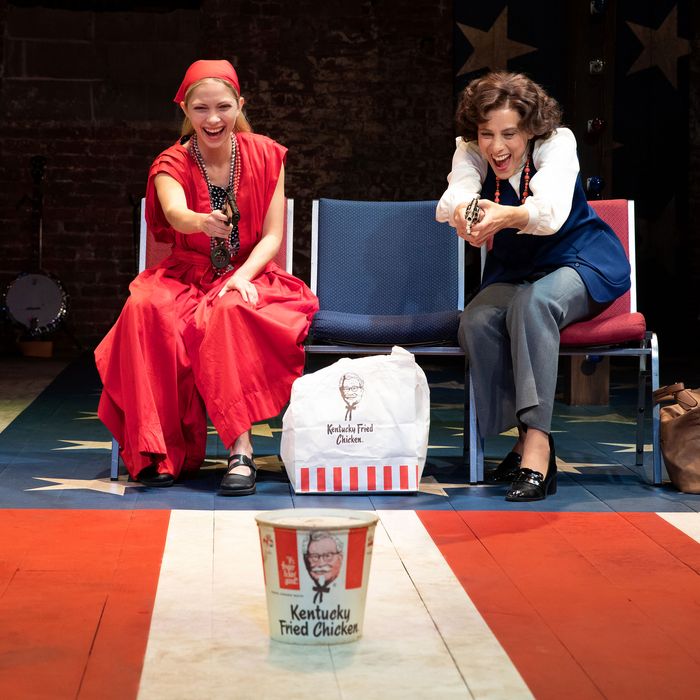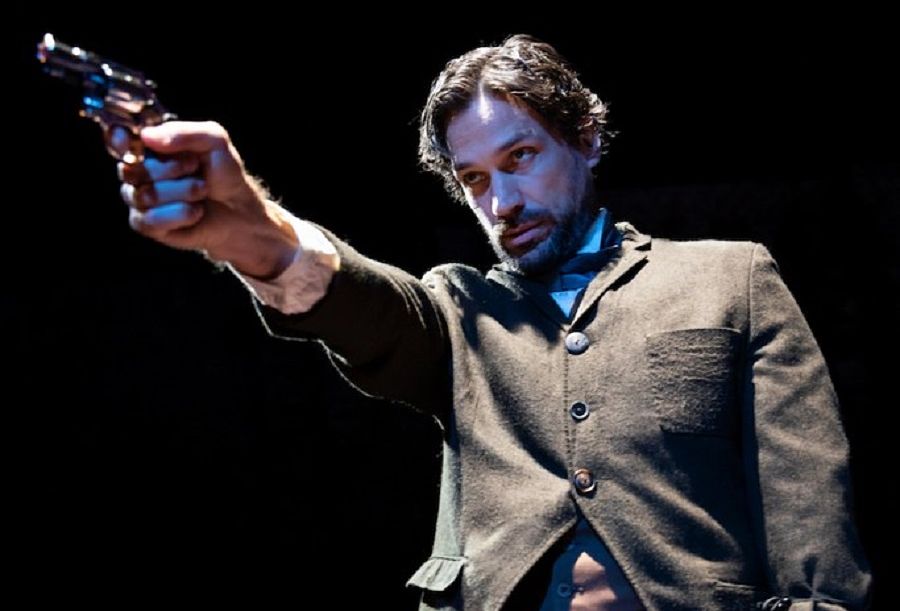When I was 12 years old, I was in a community theatre production of Assassins in Brookfield, Conn. That sentence, while surprising, is true. Don’t worry—there is no Assassins Jr. I played Billy, Sarah Jane Moore’s son, who has less than 10 lines in the musical, and appears in one brief scene to annoy his mom just before she attempts to assassinate President Ford. The role certainly is not hugely consequential for audiences, but it was a significant experience for me. I was the only child actor in a company of adults, for one thing. But the largest reason that my time as Billy in Assassins has stuck with me: the guns.
Up to that time, I had no experience with guns, real or otherwise. Other than in a police officer’s holster, I don’t know if I had even seen one close up in real life. In Assassins, obviously, guns abound: The majority of the cast play presidential assassins, and each has their own gun. In the production I was in, the actors used functional guns that shot blanks; they were realistic and loud.
On the first day of technical rehearsals, I was called later than the rest of the cast. As I walked in, all of the principal actors were onstage, holding their prop guns, and just as I entered the house, they all fired their guns; they happened to be rehearsing and training with them for the first time. The unexpected deluge of gunfire terrified me. My interactions with the guns didn’t stop here: Each night the actress playing my mother (who had previously directed me in children’s community theatre productions) pointed a gun at my head during our scene, in response to Billy’s whining for ice cream (her character relents when Squeaky Fromme gives Billy money to buy some). Is this meant to be a sick joke by John Weidman (the book writer)? I don’t remember it getting laughs. It certainly was a terrifying experience for me.
I hadn’t thought much about the musical since being in it; I had never seen it produced professionally, and hadn’t listened to the cast album in years. So when I saw Classic Stage Company’s current production of Assassins (playing through Jan. 29), directed by John Doyle, a whole host of memories came rushing back. As the show began I realized that under my mask I was mouthing the words to the opening song; I somehow still remembered the show from years ago. Seeing those actors and those guns brought it all back. But something was different: The cast had guns, but this time they weren’t as scary.
What had changed? Was it me? I’m older now. Guns are less foreign to me. While I’ve not lived through an assassination attempt, like all Americans, I have lived through a time of seemingly never-ending gun-related crimes and mass shootings. One in particular was quite close to home: The Sandy Hook school shooting in 2012 happened in the town next to me. Surely a massacre of young children would force the country to change its gun laws, we thought; it didn’t.
But it wasn’t me that had changed—I was still as skittish, scared, and uncomfortable around guns as ever. It was the staging that had changed. The production I was in as a child had used real guns with blanks, and had pointed them at the audience, and even at me. The entire experience was traumatic.
Doyle’s production takes a more sensitive approach. Signs in the lobby and a note in a program read, “All guns used during this performance are replicas that were provided, checked, and rendered inoperable by a weapons specialist for the safety of our artists and audiences. All gunshot sound effects are pre-recorded.” The actors onstage almost never point guns at the audience, and they never shoot them in the direction of the audience. The only times guns are “shot” onstage, they are pointing upstage at a small screen with projections of presidents, or directly upward to the ceiling.
Most noticeably for me: There is no child in the cast. An adult ensemble member plays Billy, suggesting his diminutive height by sitting on his knees and wearing a baseball cap.

These directorial choices are political in their own way. Most notably, they are a departure from previous productions, and not just the one I was in. In her New York Times review of the production, Laura Collins-Hughes highlighted Doyle’s lower-key usage of the guns, calling the production “defanged,” particularly for choosing not to have the actor playing Guiteau point his gun directly at audience members, as in most stagings, during an ominous pause in the lyric, “First of all when you’ve a gun….Everybody pays attention.”
I could not disagree more. In America we live with the constant threat of gun violence. We do not need realistic-looking, blank-firing guns onstage, or to have prop guns pointed in our face, to feel afraid or to understand the power of a gun. Doyle’s staging proves that guns can be like ghosts: haunting presences, powerful reminders of the potential for violence that can have their impact without needing to actively terrorize us. I also find this approach more ethical and considerate, moving away from purposefully triggering the audience (literally), instead opting for something safer, both physically and emotionally. With so much gun violence in this country, and recent deaths due to prop guns, I cannot understand how anyone would want more guns being pointed in their face.
In a phone interview, I spoke to Doyle about his directorial choices. I asked him about Billy, and he said he deliberately chose to have an adult play the role because he “didn’t want the audience to see an image, in this day and age, of a woman wanting to shoot her own child—even if it were only a joke, I just didn’t think it was appropriate.” In discussing the guns more generally, he told me, “The audience carries the gun with it—not literally, I hope, but emotionally, in a way. We are so primed, aware, it’s so hot in our conversations, the notion of the gun is there in the room already.”
Indeed, the song in which Guiteau usually points his weapon, “The Gun Song,” contains the lyric, “All you have to do is move your little finger and you can change the world.” Doyle’s production highlights that the threat isn’t so much from guns but from rhetoric. What’s scary in Assassins isn’t guns per se, but rather the tempting and beckoning empty promise of the American dream, and the frustrations of disenfranchisement it inevitably produces. This is the slippery slope that leads to dangerous events like the Jan. 6th insurrection at the nation’s Capitol, highlighted with a projected image at the end of this production of Assassins.
“I hope the production is still terrifying without the terror of guns,” Doyle told me. “Because actually that isn’t really what it’s about.” As Sondheim put it in a NYT interview the week before he died, “Assassins now has an entirely different and ominous quality to it because of what’s going on with guns and violence.” Perhaps it’s time for theatre to acknowledge that backdrop and take a different, if no less ominous, approach to guns and violence.
Christian Lewis (they/them) is a queer nonbinary freelance theatre critic with bylines in Did They Like It?, BroadwayWorld, Theatermania, Theatrely, The Brooklyn Rail, Out, and others. They co-host the podcast What’s Up Broadway? They are also a Ph.D. candidate at the CUNY Graduate Center. @clewisreviews


